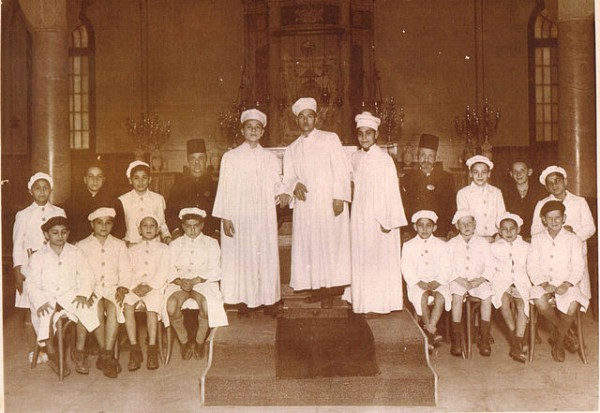
Egyptian Alexandria Jews. Choir of Rabbin Moshe Cohen in Samuel Menashe synagogue. Alexandria. (Nebi Daniel Association public photo collection)
Years ago I was able to tour through Seville and found an interesting museum dedicated to the three cultures of medieval Andalucía. These three communities have had major conflicts before and after the late 1400s, but The Christian, Muslim and Jewish communities of Seville lived in relative acceptance of one another until the Reconquista and societal push for the implementation of the Spanish Inquisition. The reason for the museum was to preserve the culture of these three communities and the pre-Inquisition era. For Spanish Muslims and Jews, the museum also stands as a memorial to a culture that for the most part no longer exists in Spain — one that keeps their memory alive as a part of Spanish heritage that is more appreciated, respected and sorely missed in modern times.
A recent documentary called “Jews of Egypt” by Amir Ramses documents the last generation of the Jewish community in Egypt from the mid-20th century until today. The film seeks to give an in-depth view of their community and their connection to Egyptian society and culture in the middle of societal change that lead to a lack of acceptance of the Jewish community in Egypt. Interviews with Egyptian Jews in France and other communities document their experiences and preserve the stories of the last generation of Egyptian Jews to grow up and reside in Jewish communities in Egypt’s major cities. While still on tour in many film festivals worldwide after its March 2014 release date, the film will likely be available for viewing this year in many theatres, except for those who have banned the film for political reasons.
In a previous post on the Jews of Iraq, I mentioned the sad state of affairs that has lead to the cultural treasures that remain of that ancient community being sequestered from the Iraqi Jewish community worldwide. Jewish people from Iraq will no longer have access to their own cultural treasures, which are currently in the hands of the U.S. government and are in the process of being returned to the Iraqi government. Like the Jewish community in Iraq, Egypt’s Jewish community should serve as an example of how ancient communities should be given due rights and equity over their own cultural traditions.
“Jews of Egypt” also documents how patriotism ties those Egyptians abroad and of a different faith to their state of origin. In so doing, the film seeks to preserve that patriotism and carry on the community, even if no one else will recognize its existence. Unfortunately, it is much simpler to regard and respect those communities that have disappeared due to ignorance in the past.
It is an embarrassment to modern society to push those communities into a state of pure historical record when we have the education, wealth and power to empower living communities. The documentary “Jews of Egypt” is likely the first move towards enlightening modern society of an issue that mirrors the disasters of a pre-enlightenment era.